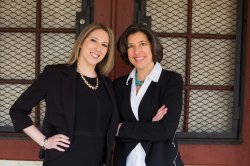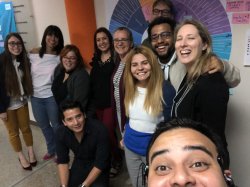Character Matters
Research institute studies how to help youth develop mindfulness, gratitude, empathy, character and more
Posted in: Humanities and Social Sciences, Research, University

Jennifer Brown Urban and Miriam Linver are proving that doing the right thing pays off.
The two professors of Family Science and Human Development, who run the Institute for Research on Youth Thriving and Evaluation (also known as the RYTE Institute), have been awarded multiple grants over the better part of the past two decades allowing them and their partnering agencies and academic institutions to study how to help adolescents thrive – not just economically and academically – but as human beings, developing self-knowledge, resilience and character.
Most recently, they’re in the midst of wrapping up a $6.2 million Boy Scouts of America (BSA) National Character Initiative grant funded by the Stephen D. Bechtel Jr. Foundation. The grant supported the second phase of an ongoing BSA national character initiative project that is focused on understanding the role adults play in youth character development.
They’ve also just received a grant for a project called “Greater Good in Action 2.0: Making the Science of Character Virtue More Practical, Engaging and Impactful,” working with the Greater Good Science Center at the University of California, Berkeley to study Greater Good in Action, an online program that provides evidence-based practices to develop skills such as mindfulness, empathy and gratitude.
Numerous other grants have been completed or are in the mix, with the RYTE Institute’s work taking on international projects from Brazil to Scotland to Kenya to Pakistan and partners including Cornell University (Cornell Office for Research on Evaluation), Tufts University (Institute for Applied Research in Youth Development), Character Scotland, Children’s Hospital of Philadelphia, and American Institutes for Research.
Over the decade-plus life of the Institute (which started as a lab), Linver and Urban have garnered more than $12 million in grants.
The work of the RYTE Institute is to help youth thrive by partnering with organizations that present opportunities for young people, and by working to explore developmental science, and program evaluation and planning from a systems science perspective in order to replicate successful practices.
“We are essentially providing the research support for studying the programs,” says Urban, who adds, “We don’t want to be outsiders coming in imposing a research framework and then disappearing. Instead we want to build capacity” in the partnering institutions.
In the case of the Youth Ready–Evoke program, for example, the RYTE Institute is working to build capacity within Honduras through its Building Character in Youth through a Game-based Solution to a Community Challenge.

Youth Ready–Evoke is a collaboration with the international humanitarian organization World Vision (Youth Ready) and the World Bank (Evoke) helping youth in Honduras who are at risk for migration to develop social, emotional skills and life skills, and then either pursue additional education, get a job or start their own business.
“We’re working with Universidad Nacional Autonoma de Honduras and we’ll be working with their students and training their students on how to do all the steps of the research project,” says Urban.
In the case of the Boy Scouts of America grant, Linver and Urban wound up helping the organization reevaluate at a time that coincided with the national organization’s bankruptcy, which was filed so that it could equitably compensate victims of abuse while continuing the mission of scouting.
“The overarching goal for that project was to understand the relationship between adult training and experience, and youth outcomes – what makes a good adult leader, essentially. However, because we had such an opportunity for data collection, we expanded the scope of the project [for] a strong focus on diversity, equity and inclusion,” Urban says. “In the period of time that we were working with them, they admitted transgender youth.”
“We also were very involved at the time girls were admitted to Cub Scouts and Scouts BSA,” she adds. “Basically, we presented and shared the body of research on single gender versus coeducational experiences and the research literature overwhelmingly supports mixed gender experiences.”

Through these and other grants, the RYTE Institute has provided numerous educational opportunities for Montclair State students.
“Another strength of the Institute is that we have so many different disciplines represented,” Urban says, listing Family Science and Human Development, Sociology, Education, Public Health, Counseling, and Psychology.
Linver adds, “Plus Social Work and many subfields within Psychology, including Developmental, Industrial, Organizational, Social, Educational Psych. Everything is or has been represented.”
Institute staff includes post-doctoral fellows, research scientists, doctoral students, master’s students, undergraduate students and college graduates thinking about getting their master’s degree or post-master’s thinking about getting their doctorate.
Linver points out that the data continues to be used long after grants have ended: “Our project in Scotland (Inspiring Purpose) from a few years ago is concluded, and we’re not getting current funding on it, but we’re still learning a lot from those data and it’s benefiting our students.” She noted that at least one student is currently building her dissertation on the Inspiring Purpose data.
“We have a lot of students who are shaped by the experience that they have within the Institute in terms of their interests,” says Linver.
Ultimately, Urban and Linver say that the RYTE Institute is fostering youth-thriving globally as well as providing world-class educational opportunities for students at Montclair State – another form of youth-thriving right here in New Jersey.
“That’s our goal,” says Urban.
Story by Staff Writer Mary Barr Mann
You may also like:
